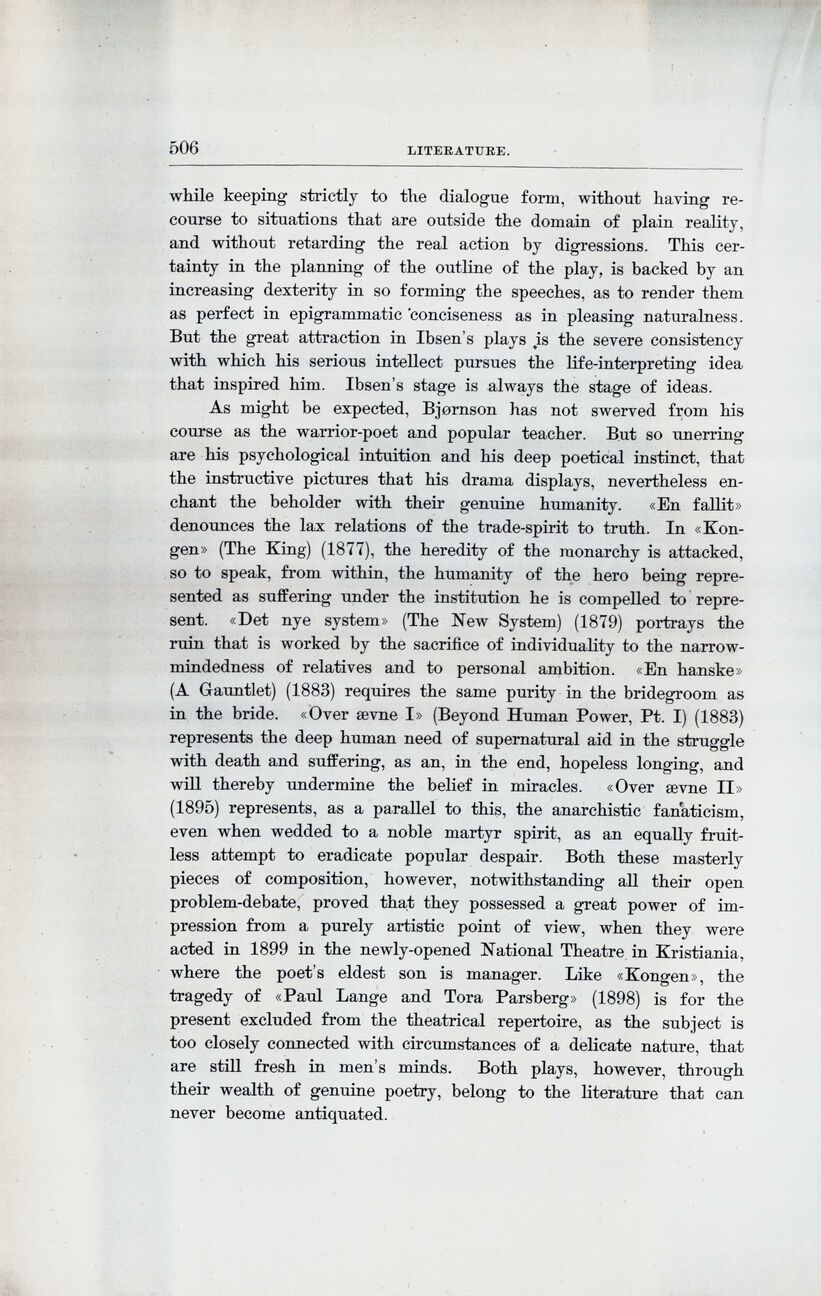
Full resolution (JPEG) - On this page / på denna sida - Literature, by Chr. Brinchmann

<< prev. page << föreg. sida << >> nästa sida >> next page >>
Below is the raw OCR text
from the above scanned image.
Do you see an error? Proofread the page now!
Här nedan syns maskintolkade texten från faksimilbilden ovan.
Ser du något fel? Korrekturläs sidan nu!
This page has been proofread at least once.
(diff)
(history)
Denna sida har korrekturlästs minst en gång.
(skillnad)
(historik)
while keeping strictly to the dialogue fonn, without having
recourse to situations that are outside the domain of plain reality,
and without retarding the real action by digressions. This
certainty in the planning of the outline of the play, is backed by an
increasing dexterity in so forming the speeches, as to render them
as perfect in epigrammatic conciseness as in pleasing naturalness.
But the great attraction in Ibsen’s plays is the severe consistency
with which his serious intellect pursues the life-interpreting idea
that inspired him. Ibsen’s stage is always the stage of ideas.
As might be expected, Bjornson has not swerved from his
course as the warrior-poet and popular teacher. But so unerring
are his psychological intuition and his deep poetical instinct, that
the instructive pictures that his drama displays, nevertheless
enchant the beholder with their genuine humanity. «En fallitt»
denounces the lax relations of the trade-spirit to truth. In
«Kongen» (The King) (1877), the heredity of the monarchy is attacked,
so to speak, from writhin, the humanity of the hero being
represented as suffering under the institution he is compelled to
represent. «Det nye system» (The New System) (1879) portrays the
ruin that is worked by the sacrifice of individuality to the
narrowmindedness [[** sjk om bindestrek]] of relatives and to personal ambition. «En hanske»
(A Gauntlet) (1883) requires the same purity in the bridegroom as
in the bride. «Over ævne I» (Beyond Human Power, Pt. I) (1883)
represents the deep human need of supernatural aid in the struggle
with death and suffering, as an, in the end, hopeless longing, and
will thereby undermine the belief in miracles. «Over ævne II»
(1895) represents, as a parallel to this, the anarchistic fanaticism,
even when wedded to a noble martyr spirit, as an equally
fruitless attempt to eradicate popular despair. Both these masterly
pieces of composition, however, not withstanding all their open
problem-debate, proved that they possessed a great power of
impression from a purely artistic point of view, when they were
acted in 1899 in the newly-opened National Theatre in Kristiania,
wrhere the poet’s eldest son is manager. Like «Kongen», the
tragedy of «Paul Lange and Tora Parsberg» (1898) is for the
present excluded from the theatrical repertoire, as the subject is
too closely connected with circumstances of a delicate nature, that
are still fresh in men’s minds. Both plays, however, through
their wealth of genuine poetry, belong to the literature that can
never become antiquated.
<< prev. page << föreg. sida << >> nästa sida >> next page >>